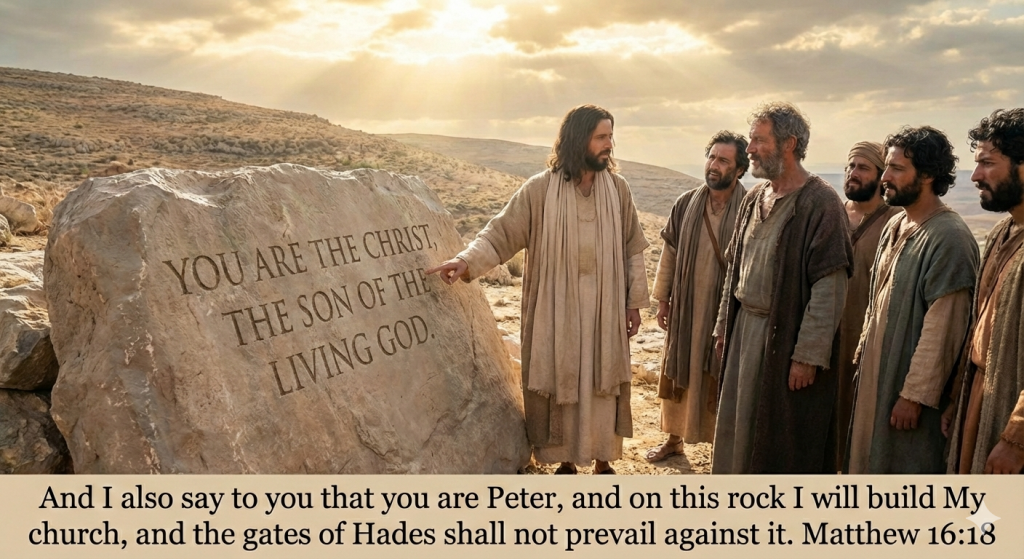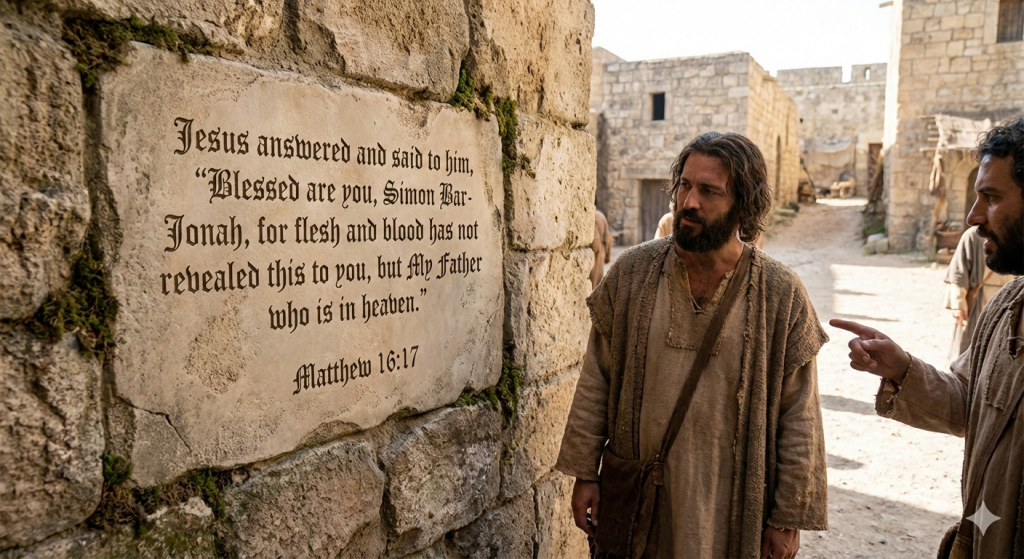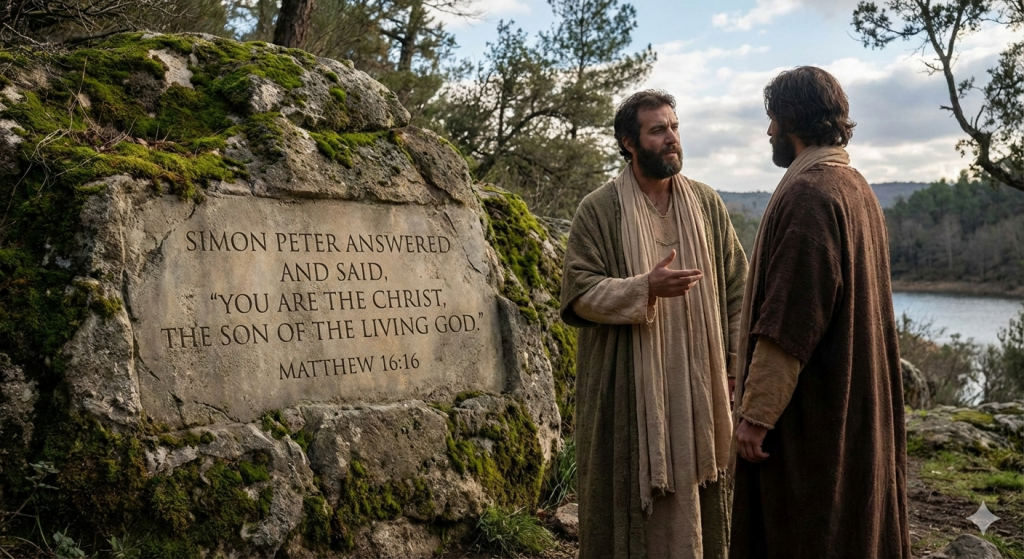Thursday, 5 February 2026
And I will give you the keys of the kingdom of heaven, and whatever you bind on earth will be bound in heaven, and whatever you loose on earth will be loosed in heaven.” Matthew 16:19
Note: You can listen to today’s commentary courtesy of our friends at the “Bible in Ten” podcast. (Click Here to listen).
You can also read this commentary, scrolling with music, courtesy of our friends at “Discern the Bible” on YouTube. (Click Here to listen), or at Rumble (Click Here to listen).
“And I will give you the keys of the kingdom of the heavens. And whatever, if you may bind upon the earth, it will be ‘having been bound’ in the heavens. And whatever, if you may loosen upon the earth, it will be ‘having been loosed’ in the heavens.” (CG).
In the previous verse, Jesus proclaimed Simon Pétros, Peter. He also said that on the Rock, He would build His out-calling, noting that the gates of Hades would not overpower her. Now, still speaking to Peter, He says, “And I will give you the keys of the kingdom of the heavens.”
A new word, kleis, a key, is introduced. The word is used both literally and figuratively. In this instance, it is figurative. A key is what provides access. An example of that is seen in Isaiah 22–
“Then it shall be in that day,
That I will call My servant Eliakim the son of Hilkiah;
21 I will clothe him with your robe
And strengthen him with your belt;
I will commit your responsibility into his hand.
He shall be a father to the inhabitants of Jerusalem
And to the house of Judah.
22 The key of the house of David
I will lay on his shoulder;
So he shall open, and no one shall shut;
And he shall shut, and no one shall open.
23 I will fasten him as a peg in a secure place,
And he will become a glorious throne to his father’s house.” Isaiah 22:20-23
Eliakim was given the key, meaning access, to the house of David. In Luke 11:52, Jesus refers to the key to knowledge. Again, the use is figurative to indicate access to knowledge. Jesus is giving Peter the keys to heaven. He next explains what that means, saying, “And whatever, if you may bind upon the earth, it will be ‘having been bound’ in the heavens.”
Access to heaven is through faith in Jesus. That is something ahead at this time for Peter. Hence, the future tense, “I will give.” The seal of salvation based on that faith is the Holy Spirit. Peter is being told that he will be the one to bind, meaning prohibit, that which is prohibited in the heavens. That is seen with the use of the perfect participle, having been bound. Likewise, Jesus says, “And whatever, if you may loosen upon the earth, it will be ‘having been loosed’ in the heavens.”
To loosen means to undo and thus to allow. Peter, along with the other apostles, was given the authority to make decisions concerning what was to be done or not done in the church, confirming that which was bound in heaven. It is not a sleight of hand to include the other apostles. Those who wrote the epistles are demonstrating the same authority.
Peter is singled out here as the first to bear this authority. But in what sense? The answer is found in Acts, where the establishment of the church is recorded. From there, its continued expansion is followed throughout its pages. Who first addressed the people of Israel after Christ’s ascension at Pentecost? It was Peter, in Acts 2.
“Now when they heard this, they were cut to the heart, and said to Peter and the rest of the apostles, ‘Men and brethren, what shall we do?’
38 Then Peter said to them, ‘Repent, and let every one of you be baptized in the name of Jesus Christ for the remission of sins; and you shall receive the gift of the Holy Spirit. 39 For the promise is to you and to your children, and to all who are afar off, as many as the Lord our God will call.’
40 And with many other words he testified and exhorted them, saying, ‘Be saved from this perverse generation.’ 41 Then those who gladly received his word were baptized; and that day about three thousand souls were added to them.”
Again, in Acts 8, the message spread to the Samaritans. The people believed, just as those in Jerusalem, but something was missing. Therefore –
“Now when the apostles who were at Jerusalem heard that Samaria had received the word of God, they sent Peter and John to them, 15 who, when they had come down, prayed for them that they might receive the Holy Spirit. 16 For as yet He had fallen upon none of them. They had only been baptized in the name of the Lord Jesus. 17 Then they laid hands on them, and they received the Holy Spirit.” Acts 8:14-17
And again, in Acts 10, the message was sent to the Gentiles, specifically Cornelius and his household –
“While Peter was still speaking these words, the Holy Spirit fell upon all those who heard the word. 45 And those of the circumcision who believed were astonished, as many as came with Peter, because the gift of the Holy Spirit had been poured out on the Gentiles also. 46 For they heard them speak with tongues and magnify God.” Acts 10:44-46
What is the common element in each account? Peter was present to verify what had already been bound in heaven. The Spirit, the proof of salvation, was poured out on the Jews through Peter’s evangelism. Salvation next went to the Samaritans, but the proof of that salvation awaited Peter’s presence. Salvation then went to the Gentiles when Peter was instructed to testify to the work of Jesus.
God’s plan of salvation was intended for all people. This is the intent of Peter’s having been given the “keys” to what was bound in the heavens. The structure of Acts makes it clearly evident that the focus of the book is on Peter from Acts 1 through 12. However, the narrative then shifts to Paul in Acts 13-28. Those things Peter did are repeated through Paul in a precise and meticulously recorded manner.
Peter, being the apostle to the circumcision, verified what God had planned. He spoke the gospel, and he possessed the keys. However, Jesus’ words in no way restrict that same ability and authority from any other person. It simply began with Peter’s witness of the unfolding events in God’s redemptive narrative.
Life application: Something quite common in Christianity is for people to claim they can “bind” a spirit, “loosen a prophetic word,” etc. When you hear this, don’t be fooled that they are somehow super spiritual or possess some gift or authority that you don’t. Such people are tossing out catch phrases that actually mean nothing.
We don’t have such authority. The Bible is written. It is our guide and authority for what we are to do in the church. We don’t need to witness proof of anyone’s salvation. That is up to God to decide. Mormons claim they are saved. Jehovah’s Witnesses do too. And yet, their doctrine is false, and their teachings are heretical.
We are to tell people about Jesus, pray for them when they have needs, rightly instruct them about the faith, and let God be God. Don’t get caught up in goofy catchphrases that actually mean diddly. Be sound in your doctrine. That is sufficient. We don’t need to impress others. We need to do what God has instructed us to do.
Glorious Lord God, may we not be like those who claim authority that we have no right to. The pope claims he sits in Peter’s seat and has the authority to decide things he has no authority over. Help us to stick to Your word, in context, and not get misdirected by false teachings that profit nothing. Amen.





